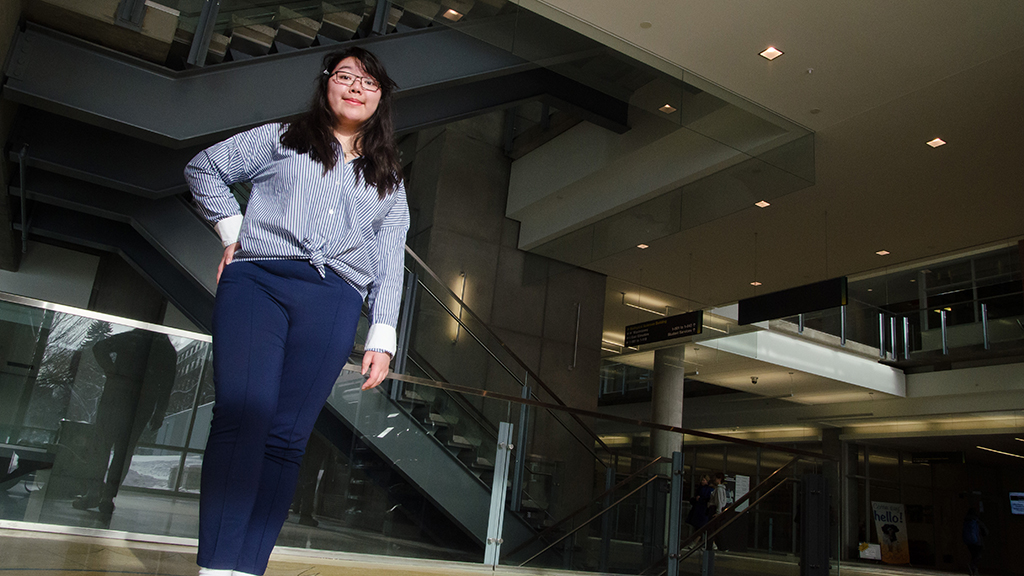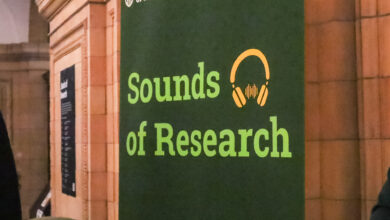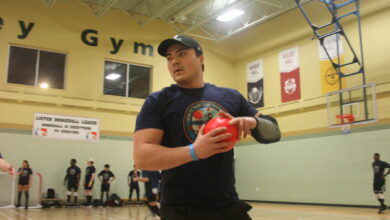One year later: Enjoying university after sweet sixteen
 Alex Migdal
Alex MigdalTo be a 16-year-old student on campus requires not only a rare breed of intelligence, but a deft handling of awkward social situations.
Say, for instance, when Marcela Louie’s friends invite her to grab a beer, unaware that she’s the youngest student at the University of Alberta.
“Usually, it’s not me bringing it up so much as if we go to a place where I need ID. It’s kind of like, hey, let’s grab a Pepsi instead,” Louie laughs.
The pitfall of the 17-year-old freshman, to be sure. But a 16-year-old? That sweet sixteen, in fact, is only recent. Louie was 15, and more than intellectually equipped, when the University of Alberta admitted her last year into the Faculty of Science.
The rarity of her feat is exceptional.
“On average, maybe one student each year that arrives at the U of A is 15 years of age,” Vice-Provost and University Registrar Lisa Collins told The Gateway in 2014, referring to statistics dating back to 1977.
“Occasionally, we’ve admitted a 14-year-old student and once we admitted an 11-year-old student. But all of these cases are quite uncommon.”
In the second grade, Louie scored an astonishing 145 on an IQ test, which put her above 99.9 per cent of children her age. She then accelerated her learning at Tempo private school in Edmonton, where she graduated last June.
So far, Louie hasn’t disclosed her esteemed title to any of her new campus friends. But the inevitable query about her age invites the same response.
“They’re surprised and they think it’s really cool that I’m their friend, when in reality, I’m more proud to be friends with them,” she says.
Half a year at the U of A has oriented Louie toward new academic interests — she switched from a general science degree in biology to an honours degree in physiology — and affirmed her lifelong dream of becoming a doctor.
For Louie, getting accepted to the U of A’s medical school by the age of 20 is a distinct possibility.
Reaching that lofty goal, though, requires near-military discipline. Louie wakes up at 6 a.m. and is on campus by 8 a.m., where she spends an hour catching up on readings before her first class.
The day, crammed with lectures and labs, ends at about 3 p.m., when she has time to meet friends and grab a snack. After she unwinds at home, often by playing the piano, Louie studies for several more hours.
“I look at it as not that I’m studying to get a good grade, but that I’m studying because I want to learn,” she says. “If you use that passion for knowledge, you can do a lot.”
Her chronic absenteeism in the university bar scene barely fazes Louie. She’s more keen on painting with watercolours, playing Assassin’s Creed and enjoying Lord of the Rings marathons with friends.
At school, Louie has thrived in organic chemistry, a course that Faculty of Science students aplenty consider the academic guillotine. She’s also unearthed a newfound passion for Latin.
Unavoidably, she’s shown her first-year foibles, such as accidentally launching her exploding highlighter down a jam-packed Tory Lecture Theatre — on the first day of class.
But it’s those memorable quirks that have left Louie feeling so delighted — and rightfully accomplished — by her nascent university experience.
“It’s not so much about your age as it is about your mindset,” she says. “It’s not so much the fact that I’m younger than you or that you’re older than me, but that we all go through the same experience.”




